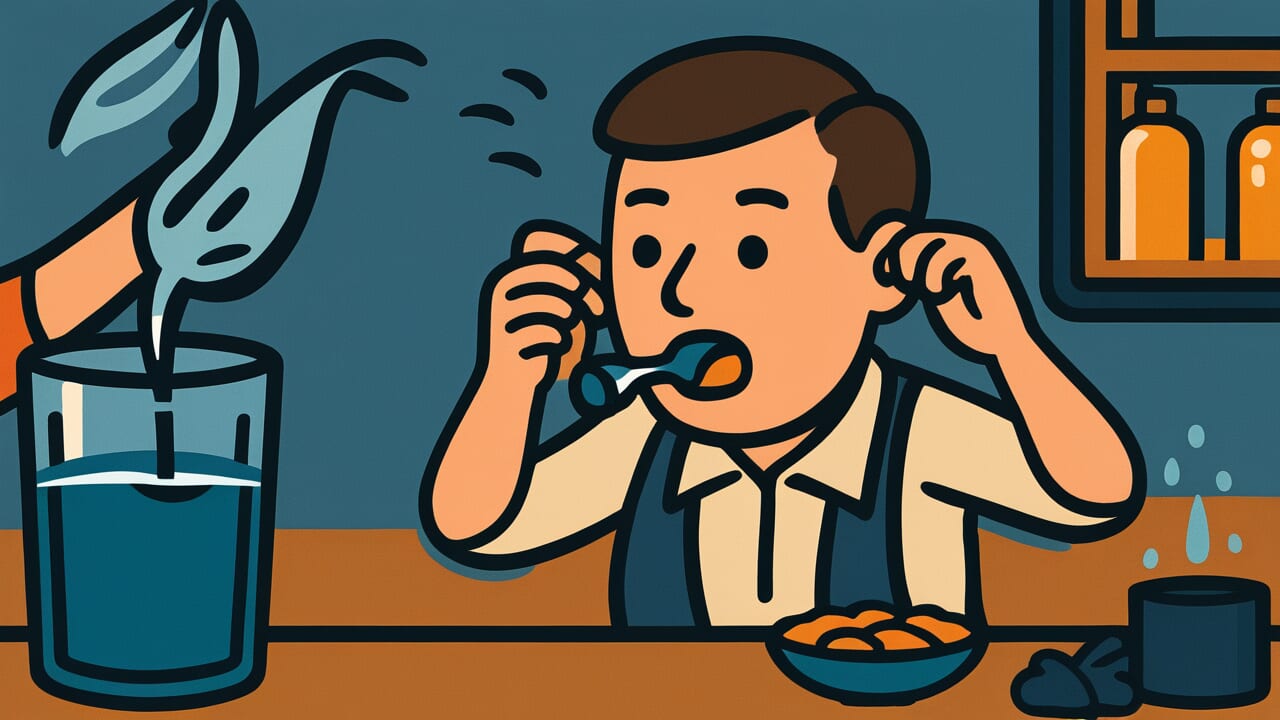How to Read “Drinking water to eat salted fish guts”
Shiokara wo kuō tote mizu wo nomu
Meaning of “Drinking water to eat salted fish guts”
This proverb teaches the importance of taking necessary preparations and proper steps to achieve your goals.
Drinking water before eating shiokara is a rational preparation based on predicting the result. You know eating shiokara will make you thirsty.
Today, people use this saying when talking about getting things ready before starting something. It also shows that things have a proper order.
For example, gathering information before starting a big project. Buying reference books before studying for exams. Checking your belongings before going on a trip.
These are all natural preparation actions. People use this expression to praise carefulness in preparation and wisdom in looking ahead.
It recognizes the value of taking steady steps rather than rushing into the main task.
Origin and Etymology
No clear written records explain the origin of this proverb. However, we can make interesting observations from how the phrase is structured.
Shiokara is preserved seafood pickled in salt. During the Edo period, it was essential food on common people’s tables.
Its intense saltiness is something you can imagine even before eating it. The old expression “kuō tote” means “in order to eat.”
It represents the preparation stage before taking action.
The interesting part of this proverb is the inevitability of drinking water before eating shiokara. Anyone who knows the strong salty taste predicts they will get thirsty after eating.
So they prepare water in advance or drink water beforehand. This is not just preparation. It is wise action based on foreseeing the result.
This expression likely came from the life wisdom of common people in the Edo period. It teaches that things have an order and preparation with foresight matters.
By using shiokara, a familiar food item, as an example, it became an easy-to-understand lesson that everyone could relate to.
Usage Examples
- If you’re starting a new business, like drinking water to eat salted fish guts, begin with market research first
- He never neglects preparation before a match, truly embodying the attitude of drinking water to eat salted fish guts
Universal Wisdom
This proverb has been passed down because it recognizes the value of “the power to see ahead” that humans possess.
We are creatures who want to jump at immediate desires. If something looks delicious, we want to eat it right away. If something seems interesting, we want to start immediately.
However, experienced people know better. The ability to imagine what awaits ahead and determine what to do now separates success from failure.
Eating shiokara makes you thirsty. This is a simple cause-and-effect relationship everyone knows.
Yet whether you can act on that simple truth tests your wisdom. Preparation is the act of pulling the future into the present.
You imagine something that hasn’t happened yet and take action in this very moment. This is a special ability only humans possess.
This proverb understands human nature’s tendency to be swept away by impatience and impulse. It teaches the importance of having room to pause and think.
Rather than charging toward your goal, imagine the path ahead and prepare what you need before moving forward.
Our ancestors learned this wisdom, which seems obvious but is difficult, from their everyday dining tables.
When AI Hears This
The interesting aspect of this proverb is how it points out a cognitive distortion. Humans treat “discomfort that hasn’t happened yet” the same as “discomfort that already happened.”
Behavioral economics experiments show something fascinating. People feel pain from losing 100 yen about twice as strongly as joy from gaining 100 yen.
In other words, our brains are wired to overestimate losses.
Drinking water before eating shiokara is exactly this loss aversion bias running wild. To avoid the “expected discomfort” of saltiness, you prepay the cost of water that should be unnecessary.
What’s interesting here is this: you could simply drink water after eating shiokara. Yet people fear the “loss of getting thirsty later” and take preventive action.
This has the exact same structure as modern people’s behavior. Over-purchasing insurance or choosing expensive plans for features they never use.
Looking deeper, this proverb also suggests the concept of “temporal discounting of losses.” You try to offset small future discomfort with certain present cost.
Thinking probabilistically, you might not eat the shiokara. It might not be as salty as you thought.
But the human brain chooses “just in case, take measures” over “maybe it’ll be fine.”
Lessons for Today
Modern society has a strong tendency to demand immediate results. We live in an era where you can shop with one click and get information instantly.
That’s exactly why we need to reconsider the “value of preparation” this proverb teaches.
When you try to challenge something new, pause and think first. What awaits ahead? What difficulties can you predict? What should you prepare now for those challenges?
Rather than jumping in hastily, take a breath and get things in order. That composure will ultimately lead you to success.
Preparation is never a waste of time. It is an investment in your future.
Like drinking water before eating salted fish guts, small preparations add up. They create a reliable path to achieving big goals.
There’s another saying: “More haste, less speed.” The attitude of not sparing this extra effort is the secret to enriching your life.
Starting today, why not develop the habit of asking yourself “What preparation do I need?” before beginning anything?



Comments